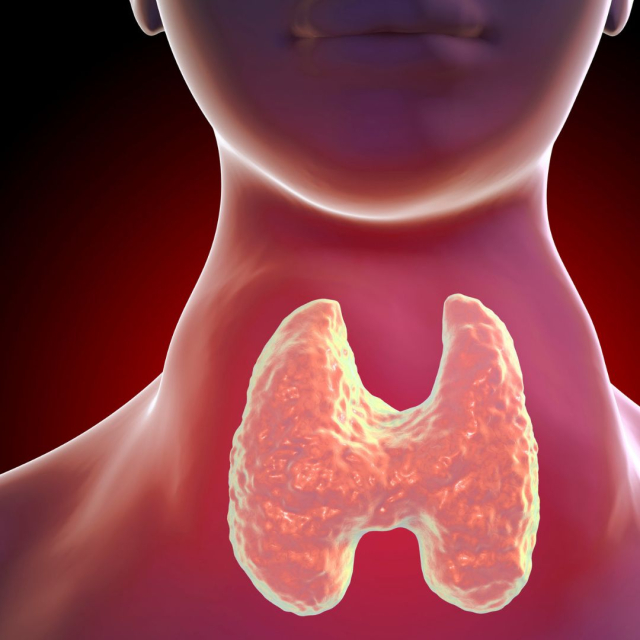Hyperthyroidism is an endocrine system disorder that occurs when the thyroid gland produces an excessive amount of thyroid hormones. These hormones play a crucial role in the body's metabolism, growth, and development, so an imbalance can have a significant impact on health.
What is hyperthyroidism?
The thyroid gland is a butterfly-shaped organ located at the front of the neck, just below the Adam's apple. It produces two main hormones: triiodothyronine (T3) and thyroxine (T4), which regulate the body's metabolism. When these hormones are produced in excess, hyperthyroidism develops.
The disorder affects people of all ages, but is more common in women, especially between the ages of 20 and 40. If left untreated, hyperthyroidism can lead to serious complications, including cardiovascular disease, osteoporosis and a condition known as thyroid storm.
Causes of hyperthyroidism
Hyperthyroidism can be caused by a variety of factors, including:
Graves' disease
The most common cause of hyperthyroidism is Graves' disease, an autoimmune disorder in which the immune system attacks the thyroid gland, causing an overproduction of hormones.
Thyroid nodules
Thyroid nodules are abnormal growths in the thyroid gland that can become overactive and produce too many hormones.
Thyroiditis
Inflammation of the thyroid gland, known as thyroiditis, can cause stored hormones to be released in large quantities. This can be temporary or chronic.
Excessive consumption of iodine
Iodine is essential for the production of thyroid hormones. However, too much iodine in the diet or in medications can trigger hyperthyroidism.
Medications
Certain medications, such as amiodarone, can interfere with thyroid function and cause hyperthyroidism.
Symptoms of hyperthyroidism
Symptoms of hyperthyroidism vary from person to person and may include:
Unexplained weight loss, despite a normal or increased appetite.
Palpitations or rapid heart rate (tachycardia).
Nervousness, anxiety and irritability.
Excessive sweating and sensitivity to heat.
Muscle weakness, especially in the arms and legs.
Tremor in the hands.
Insomnia or difficulty sleeping.
Changes in the menstrual cycle in women.
Enlargement of the thyroid gland (goiter).
Bulging eyes (exophthalmos), a common symptom of Graves' disease.
It is important to note that some patients may experience mild symptoms or even be asymptomatic, making early diagnosis difficult.
Diagnosis of hyperthyroidism
To diagnose hyperthyroidism, doctors usually perform a combination of clinical evaluations and laboratory tests. The most common tests include:
Blood test
The level of thyroid hormones (T3 and T4) and thyroid-stimulating hormone (TSH) is measured. In hyperthyroidism, T3 and T4 levels are usually elevated, while TSH is suppressed.
Imaging tests
Thyroid scan and ultrasound are used to evaluate the size, shape, and function of the thyroid gland.
Radioactive iodine uptake test
This test measures how the thyroid gland uses iodine, which helps identify the underlying cause of hyperthyroidism.
Treatment of hyperthyroidism
Treatment for hyperthyroidism depends on the underlying cause, the severity of symptoms, and the patient's age. Options include:
Antithyroid drugs
Medications such as methimazole and propylthiouracil reduce the production of thyroid hormones. They are effective in many cases, but can have side effects such as skin rashes and liver problems.
Radioactive iodine therapy
Radioactive iodine destroys overactive thyroid cells, reducing hormone production. This treatment is permanent and in some cases can lead to hypothyroidism, which requires lifelong treatment with thyroid hormones.
Surgery
Thyroidectomy, or partial or complete removal of the thyroid gland, is an option for patients who do not respond to other treatments or who have a large goiter that causes swallowing or breathing problems.
Symptomatic treatments
Beta blockers, such as propranolol, help control symptoms such as tachycardia and tremor, but do not treat the underlying cause.
Complications of hyperthyroidism
If left untreated, hyperthyroidism can lead to serious complications, including:
Thyroid storm : A rare but potentially life-threatening condition that causes high fever, rapid heart rate, and confusion.
Cardiovascular problems : Such as heart failure and atrial fibrillation.
Osteoporosis : Overproduction of thyroid hormones can weaken bones.
Management and lifestyle
In addition to medical treatment, patients with hyperthyroidism may benefit from lifestyle changes, such as:
Maintain a balanced and nutrient-rich diet.
Reduce caffeine and alcohol consumption, which can exacerbate symptoms.
Practice relaxation techniques, such as yoga and meditation, to manage stress.
Attend regular check-ups with your doctor to monitor your thyroid function.
Hyperthyroidism is a complex condition that can affect multiple aspects of health. Early diagnosis and proper treatment are essential to control symptoms and prevent complications.
If you suspect you may have hyperthyroidism or have risk factors, consult a healthcare professional. The right information and support can make a big difference to your quality of life.
